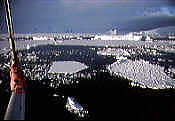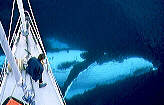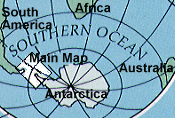
![]()
.
.
.
.
.

.
.
.

.
.
.
.
.
.
.
.
.
.
.

![]()

[
Logbook Index ]

Log
Entry for 11 January 1997
Position at 1730 GMT: 62-14 S 58-41 W
Click chart for details
Anchored Jubany Base, King George
Island
|
After the gale is over, the crossing of the Drake becomes a more cheerful event. The wind is blowing from N-NW at 20-25 knots and the crew starts getting into a relaxed rhythm. On board it is less bumpy and drier. We are heading for King George Island often touching 9 knots of speed. At 3 am, when Skip and Elena go on watch, it is already day. At these latitudes it never gets truly dark but there are a few hours of dusk. The weather is very grey, almost spooky and mysterious. The ocean is dark and the fog allows a mere 200 metres visibility. On deck, jokes are told about being swallowed into a different dimension and disappearing like Captain Nemo. We are expecting to see both land and icebergs but our eyes can reach only as far as the big wave that is just ahead of Pelagic. We are now following a course of 125 degrees. At 0925 am, Paddy Barry at the helm shouts land ho! The snowy peak of Cape Melville, about 600 metres high appears on the horizon. On the radar it is barely 5 miles off. Slowly the thick fog starts to lift and icebergs of varied sizes and shapes appear all around the boat. Except for Skip and the second in command, the Frenchman living in New Zealand, Patrick, this is the crew's first sight of Antarctica, so cameras are enthusiastically deployed. As we near the coast, we are greeted by numerous groups of chin strap penguins, happily following along Pelagic's course - diving in and out of the ocean. They are small with a black stripe under their chin as if they were wearing some sort of cap. King George Island is one of the major breeding grounds for this type of penguin, and the strong smell from their colonies reaches Pelagic in gusts as we move along the shoreline. In the distance, we also spot the blow of a couple of humpback whales. Sailing now involves picking our way through icebergs and rocks, but the wind is good and we are running under full sail. To reach our chosen anchorage, we have to travel along the whole southern coast of the island, which the Argentines call "25 de Mayo" in their ongoing dispute over sovereignty with the British. Finally we enter Potters Cove and anchor at 1730. Our position is 62 14 S 58 41 W, right in front of the Jubany Antarctic Base, which is under Argentine jurisdiction. The South Shetland Island group is host to one of the major concentrations of scientific bases in the Antarctic. Argentina, Chile, Brazil, Poland, China, Uruguay, Korea and Russia all have a station on King George Island. Jubany is named after an Argentine aviation lieutenant and was established in 1953 as a shelter for the Argentine Navy. The base was then handed over to the scientific program in 1982. During the southern summers it houses about 65 people, in winter only 20 remain. At the moment Argentine scientists and a large number of German graduates are carrying out biological studies on the sea lions and different species of birds. Jubany is one of the three Antarctic stations responsible for monitoring the green house effect and here two Italians are assigned to this task . Major Adolfo Irusta, the commander of the base, invites the Pelagic- South Aris crew for dinner at 2100. Saturday night is pizza night. The evening ends in Irish singing and guitar playing! Having completed the first stage of the trip, we are looking forward to the rendezvous with M/S Molchanov, the ship bringing the 'Tom Crean' from Ushuaia, on the 14 January. Our main concern is whether to meet the ship here at King George Island or at Elephant Island, where Shackleton's epic journey in 1916 actually began. Much will depend on the weather. The Elephant Island rendezvous is only possible for the big Russian ship Molchanov if the conditions are ideal. In the event of poor weather we will have no choice but to discharge the 'Tom Crean' here and add another 120 miles to the Irish voyage. Elena Caputo |
